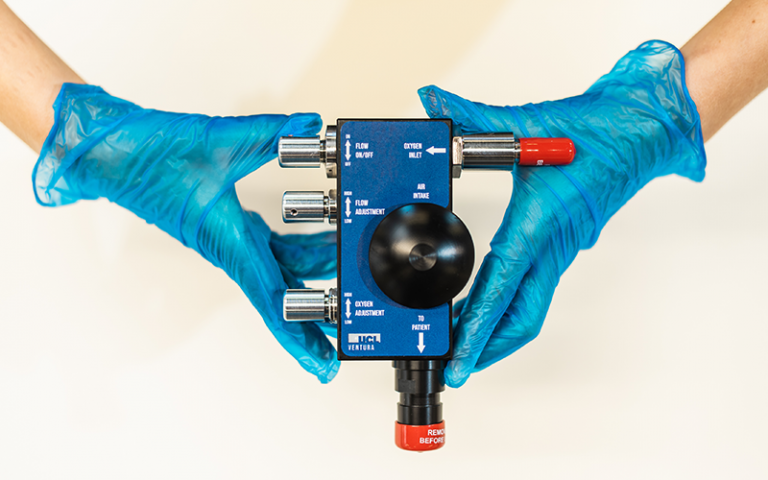UCL-Ventura CPAP breathing aid: interdisciplinary working to solve a COVID-19 challenge at pace
In March 2020 the UCL-Ventura team designed a simple, cost-effective and reusable breathing aid for COVID-19 patients, which went on to save lives globally.

20 April 2022
In mid-March 2020 SARS-CoV-2 (COVID-19) admissions to intensive care units across the UK markedly increased. The NHS predicted it would need to care for 30,000 COVID-19 patients with severe respiratory failure - nine times more than the number of critical care beds available at the time. These patients would need invasive mechanical ventilation (IMV) to help them breathe but, with a huge global surge in demand, there were no extra ventilators available to buy at short notice. Notwithstanding the lack of ventilators, critical care services would still be overwhelmed for lack of beds and specialist staff.
Addressing the challenge
The UCL-Ventura team spanned UCL engineers and UCL/ UCLH Hospital (UCLH) intensive care specialists led by Professors Rebecca Shipley, Mervyn Singer, Tim Baker, David Lomas and Dr David Brealey. They first met to discuss their response to the pandemic on 17 March 2020. They determined it was far more advantageous to support disturbed breathing and poor oxygenation with a non-invasive support device and thus keep people off ventilators and out of intensive care. The Formula-1 car engine manufacturer, Mercedes AMG-HPP, rapidly came on board.
The grand plan was to re-engineer an out-of-patent device, make it more oxygen-efficient to help conserve parlous hospital oxygen supplies, test it on volunteers and patients, achieve regulatory approval, and then manufacture at scale. And, crucially, despite a national lockdown, to achieve the above as quickly as possible as time was very much of the essence.
The device is based on a concept called continuous positive airways pressure (‘CPAP’). The patient wears a tight-fitting face mask or head helmet through which they inhale a titratable air-oxygen mix delivered under high flow. They then breathe out through a resistance valve. This technique keeps the airways splinted open, improving gas exchange within the diseased lung and thus improving oxygenation of the blood. CPAP devices are widely used across the NHS, though generally in high-dependency ward settings such as critical care units. There were similar issues with international shortages of CPAP devices in March 2020 but, being a purely mechanical device, meant the UCL-Ventura could be made in bulk and at pace.
Rapid manufacture and global distribution
Remarkably, and testament to the unstinting efforts not just of the core UCL-Mercedes team but other groups who supported the project, 10,000 UCL-Ventura CPAP devices commissioned by the Department of Health and Social Care were delivered within a month of idea conception.
This included design and manufacture of new oxygen analysers, provision of necessary face/head masks and tubing, trialling on patients, fast-track regulatory approval by the Medicines and Healthcare products Regulatory Agency (MHRA) for six new medical devices, and a ‘just-in-time’ rapid distribution network organized by the automotive logistics company, G-TEM. CPAP devices and consumables kits were distributed across more than 130 NHS hospitals in England, the devolved nations, crown dependencies and overseas territories.
The UCL Ventura team also recognised the need to support other countries in their fight against COVID-19, especially those less well-resourced than the UK. Full design and manufacturing instructions were provided at zero-cost to support manufacture and educational materials (leaflets, videos, webinars) produced in multiple languages to support training. To date, over 25,000 devices have been manufactured globally and 25 countries in South and Central America, Africa and Asia have achieved local manufacture and deployment to hospitals. More than 3,000 devices have also been donated by the UK and other governments, charities, and companies to countries including India, Nepal, Uganda, Palestine, South Africa, Zimbabwe and Namibia.
Patient benefit
The UCL Ventura has complemented other available CPAP devices in significantly reducing the need for mechanical ventilation and mortality, as shown by a large randomised multicentre UK trial. An analysis of 83 observational studies worldwide indicated that approximately two thirds of COVID-19 patients receiving CPAP did not subsequently require invasive ventilation. Even frail patients not deemed suitable for invasive ventilation could benefit from CPAP – approximately 30% of this patient cohort survived to leave hospital.
Nationally, the need for invasive ventilation of COVID-19 patients in intensive care has fallen from 72% in the first wave to 43% in Autumn 2021, despite similar illness severity on ICU admission. Mortality over this period has reduced by a third. Time occupying an intensive care bed has also reduced significantly, allowing faster turnover. Importantly, CPAP delivered outside the intensive care unit could spare vital and overstretched ICU capacity.
Many ‘pop-up’ high dependency units were created to deliver non-invasive breathing support to COVID-19 patients. UCLH established the first such unit in the UK, rapidly training many non-specialist doctors and nurses. UCLH was also at the forefront of changing NHS guidance to incorporate CPAP use into COVID-19 management.
Research synopsis
The UCL-Ventura CPAP COVID-19 breathing aid: interdisciplinary working to solve a healthcare challenge at pace
In March 2020 the UCL-Ventura team designed and manufactured a simple, cost-effective and noninvasive breathing aid for COVID-19 patients. 10,000 devices were delivered to the Department of Health and Social Care within a month of idea conception. To date, over 130 NHS hospitals have been supplied and a further 25,000 devices manufactured for use in 25 countries worldwide.
Links
- Professor Rebecca Shipley’s academic profile
- Professor Mervyn Singer’s academic profile
- UCL Institute of Healthcare Engineering
- UCL Division of Medicine
- UCL Faculty of Engineering Sciences
- UCL Faculty of Medical Sciences REF 2021
- UCL Faculty of Engineering Sciences REF 2021
Image
- Image credit: James Tye / UCL
 Close
Close

